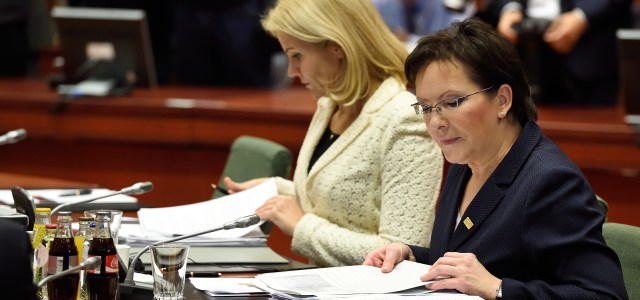Poland was instrumental in preventing more ambitious goals at last fall’s EU energy and climate target negotiations in Brussels. Over the long run, however, this strategy may backfire, as Michał Olszewski warns.

The Polish prime minister Ewa Kopacz (front) got what she wanted out of the EU’s 2030 climate and energy negotiations – weak targets and exceptions for the Polish coal industry. (© European Union, 2015)
At first glance, one might think that Polish Prime Minister Ewa Kopacz enjoyed huge success at the recent EU 2030 climate and energy negotiations. The Climate Summit of the European Council ended according to plan for the Polish delegation, which was never forced to use a veto. The most difficult demand to accept for the Polish was that by 2030, the EU would be required to have reduced its total CO2 emissions by at least 40 percent compared to the levels from 1990. However, in return for agreeing to such an arrangement, countries highly dependent on coal-fired power received a promise of substantial economic compensation. The other two issues of the 2030 goals — regarding renewable energies and energy efficiency — did not evoke as many emotions in Poland as did the climate goal. These objectives are no longer binding on the national level, which really only means that the EU’s performance in the end depends solely on the good will of the member states.
A very interesting question is what the compensation for countries such as Poland would look like. Poland, like other countries whose GDP is less than 60 percent the EU average, will be able to continue to provide free CO2 permits to its energy companies until 2030. Preliminary estimates by the Polish government suggest that the value of these licenses will be approx. 5 billion Euros (around 6.1 billion USD). In addition, Poland receives more than 2 billion Euros thanks to the so-called European “modernization fund”. This fund aims to help push construction of cleaner energy sources throughout Europe.
The main thing that the Polish government describes as a gigantic success from the 2030 negotiations is essentially a repetition of a well-known pattern: The primary demand of the Polish government back in 2008 during the 2020 climate goal negotiations was “derogation”. This meant that the Polish industry would receive free emission allowances of approx. 7 billion Euros. The money obtained through this mechanism was to be used to modernize and gradually decrease energy production from coal. Yet things turned out differently: the majority of this money has so far been used for new investments in coal-fired power. Moreover, there has been fraud and abuses in this process: in order to receive more EU money, Poland reported the construction of new power plants in agricultural areas where today cows are still grazing and no power plants are to be found. Will Poland change its tactic this time? I seriously doubt it.
The consequences of such a strategy will undoubtedly hit Poland in the coming decades. If the EU maintains a low-carbon policy, mining and burning coal could become more expensive under a reformed emissions trading scheme. This means that even the modernization of old power plants and the construction of new ones would not help much. Will Poland turn into a coal museum? The new 2030 climate and energy goals, and the distribution of subsequent funds, seem to confirm the role of Poland in the EU’s climate and energy discussions. One cannot detect any long-term strategy in the actions of Prime Minister Ewa Kopacz, except for the desire to maintain the current system, the foundations of which are large, powerful (coal) energy companies. The Polish position is thus based on a clear imperative: she wants to protect her domestic coal sector and keep miners happy. Money coming from the EU makes allows this position to still be possible.
Michał Olszewski (born 1977) – journalist, reporter, writer. For more than twelve years he worked for Gazeta Wyborcza and Tygodnik Powszechny, where he concentrated mostly on environmental issues. He is engaged in a Krakow-based campaign against air pollution.